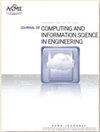GLHAD: A Group Lasso-based Hybrid Attack Detection and Localization Framework for Multistage Manufacturing Systems
IF 2.6
3区 工程技术
Q2 COMPUTER SCIENCE, INTERDISCIPLINARY APPLICATIONS
Journal of Computing and Information Science in Engineering
Pub Date : 2023-10-20
DOI:10.1115/1.4063862
引用次数: 0
Abstract
Abstract As Industry 4.0 and digitization continue to advance, the reliance on information technology increases, making the world more vulnerable to cyberattacks, especially cyber-physical attacks that can manipulate physical systems and compromise operational data integrity. Detecting cyberattacks in multistage manufacturing systems (MMS) is crucial due to the growing sophistication of attacks and the complexity of MMS. Attacks can propagate throughout the system, affecting subsequent stages and making detection more challenging than in single-stage systems. Localization is also critical due to the complex interactions in MMS. To address these challenges, a group lasso regression-based framework is proposed to detect and localize attacks in MMS. The proposed algorithm outperforms traditional hypothesis testing-based methods in expected detection delay and localization accuracy, as demonstrated in a simple linear multistage manufacturing system.基于分组套索的多阶段制造系统混合攻击检测与定位框架
随着工业4.0和数字化的不断推进,对信息技术的依赖日益增加,使得世界更容易受到网络攻击,特别是可以操纵物理系统并破坏操作数据完整性的网络物理攻击。由于攻击的复杂性和多阶段制造系统的复杂性日益增加,检测多阶段制造系统(MMS)中的网络攻击至关重要。攻击可以在整个系统中传播,影响后续阶段,并使检测比单阶段系统更具挑战性。由于MMS中复杂的交互作用,定位也很重要。为了解决这些问题,提出了一种基于分组回归的MMS攻击检测和定位框架。在一个简单的线性多阶段制造系统中,该算法在期望检测延迟和定位精度方面优于传统的基于假设检验的方法。
本文章由计算机程序翻译,如有差异,请以英文原文为准。
求助全文
约1分钟内获得全文
求助全文
来源期刊
CiteScore
6.30
自引率
12.90%
发文量
100
审稿时长
6 months
期刊介绍:
The ASME Journal of Computing and Information Science in Engineering (JCISE) publishes articles related to Algorithms, Computational Methods, Computing Infrastructure, Computer-Interpretable Representations, Human-Computer Interfaces, Information Science, and/or System Architectures that aim to improve some aspect of product and system lifecycle (e.g., design, manufacturing, operation, maintenance, disposal, recycling etc.). Applications considered in JCISE manuscripts should be relevant to the mechanical engineering discipline. Papers can be focused on fundamental research leading to new methods, or adaptation of existing methods for new applications.
Scope: Advanced Computing Infrastructure; Artificial Intelligence; Big Data and Analytics; Collaborative Design; Computer Aided Design; Computer Aided Engineering; Computer Aided Manufacturing; Computational Foundations for Additive Manufacturing; Computational Foundations for Engineering Optimization; Computational Geometry; Computational Metrology; Computational Synthesis; Conceptual Design; Cybermanufacturing; Cyber Physical Security for Factories; Cyber Physical System Design and Operation; Data-Driven Engineering Applications; Engineering Informatics; Geometric Reasoning; GPU Computing for Design and Manufacturing; Human Computer Interfaces/Interactions; Industrial Internet of Things; Knowledge Engineering; Information Management; Inverse Methods for Engineering Applications; Machine Learning for Engineering Applications; Manufacturing Planning; Manufacturing Automation; Model-based Systems Engineering; Multiphysics Modeling and Simulation; Multiscale Modeling and Simulation; Multidisciplinary Optimization; Physics-Based Simulations; Process Modeling for Engineering Applications; Qualification, Verification and Validation of Computational Models; Symbolic Computing for Engineering Applications; Tolerance Modeling; Topology and Shape Optimization; Virtual and Augmented Reality Environments; Virtual Prototyping

 求助内容:
求助内容: 应助结果提醒方式:
应助结果提醒方式:


